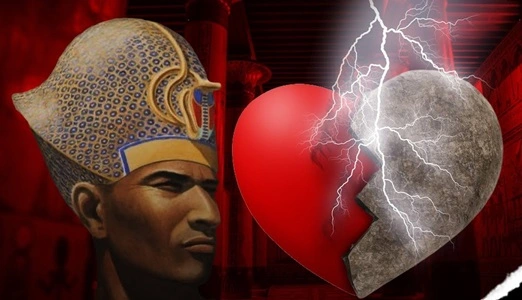The narrative of God hardening Pharaoh’s heart in the Book of Exodus has long been a subject of theological debate and interpretation. This complex interplay between divine sovereignty and human free will raises profound questions about justice, mercy, and the nature of God’s intervention in human affairs.

The Biblical Account
In the Exodus narrative, Moses is commanded by God to demand Pharaoh release the Israelites from slavery. Pharaoh’s repeated refusals are attributed to a hardened heart—a condition described in various ways:
- Pharaoh hardens his own heart (Exodus 8:15, 8:32, 9:34).
- Pharaoh’s heart becomes hard without specifying the agent (Exodus 7:13, 7:22, 8:19, 9:7).
- God hardens Pharaoh’s heart (Exodus 9:12, 10:20, 10:27, 11:10, 14:8).
This alternating attribution suggests a dynamic interaction between Pharaoh’s own choices and divine action.
Pharaoh’s Own Hardening
Initially, the text indicates that Pharaoh hardened his own heart. For instance, after the plague of frogs, “when Pharaoh saw that there was relief, he hardened his heart” (Exodus 8:15). This pattern suggests that Pharaoh’s stubbornness and refusal to heed warnings were self-initiated, reflecting his resistance to divine commands.
Divine Hardening
As the plagues progress, the narrative shifts to God hardening Pharaoh’s heart. After the sixth plague, “the Lord hardened Pharaoh’s heart, and he did not listen to them” (Exodus 9:12). This shift raises questions about divine justice and human accountability.
Theological Interpretations
Scholars offer various interpretations to reconcile this tension:
- Judicial Hardening: Some view God’s hardening as a judicial act—a response to Pharaoh’s persistent rebellion. Pharaoh’s repeated self-hardening leads to a point where God confirms his decision, allowing him to face the consequences of his choices.
- Divine Sovereignty: Others emphasize God’s sovereignty, suggesting that the hardening serves a greater purpose in demonstrating God’s power and fulfilling divine plans. Romans 9:17-18 reflects this view: “For the Scripture says to Pharaoh: ‘I raised you up for this very purpose, that I might display my power in you.'”
- Interplay of Free Will and Divine Action: Another perspective considers the hardening as a complex interplay between human free will and divine action. Pharaoh’s initial choices set a trajectory that God then uses to achieve a greater purpose, illustrating both human responsibility and divine orchestration.
Purpose of the Hardening
The hardening of Pharaoh’s heart serves multiple purposes within the Exodus narrative:
- Demonstration of Divine Power: The escalating plagues and Pharaoh’s resistance highlight God’s supremacy over Egyptian deities and the natural order. Each plague challenges specific aspects of Egyptian belief, culminating in a demonstration of Yahweh’s unparalleled authority.
- Fulfillment of Divine Promises: The hardening facilitates the fulfillment of God’s promises to Israel, leading to their liberation and the establishment of a covenant relationship. Pharaoh’s resistance sets the stage for a dramatic deliverance that becomes central to Israel’s identity.
- Moral and Spiritual Lessons: The narrative serves as a cautionary tale about the dangers of pride and obstinacy. Pharaoh’s downfall exemplifies the consequences of resisting divine will and ignoring moral imperatives.
Contemporary Reflections
The story of Pharaoh’s hardened heart continues to resonate in discussions about free will, divine justice, and human agency. It challenges readers to reflect on their own responses to moral and spiritual guidance and the potential consequences of hardening one’s heart against truth and compassion.
Conclusion
The hardening of Pharaoh’s heart is a multifaceted narrative that intertwines themes of divine sovereignty and human responsibility. It invites readers to explore the complexities of moral choice, the nature of divine intervention, and the profound lessons embedded in ancient texts. Through this story, the enduring questions of justice, mercy, and human agency continue to inspire reflection and dialogue.



